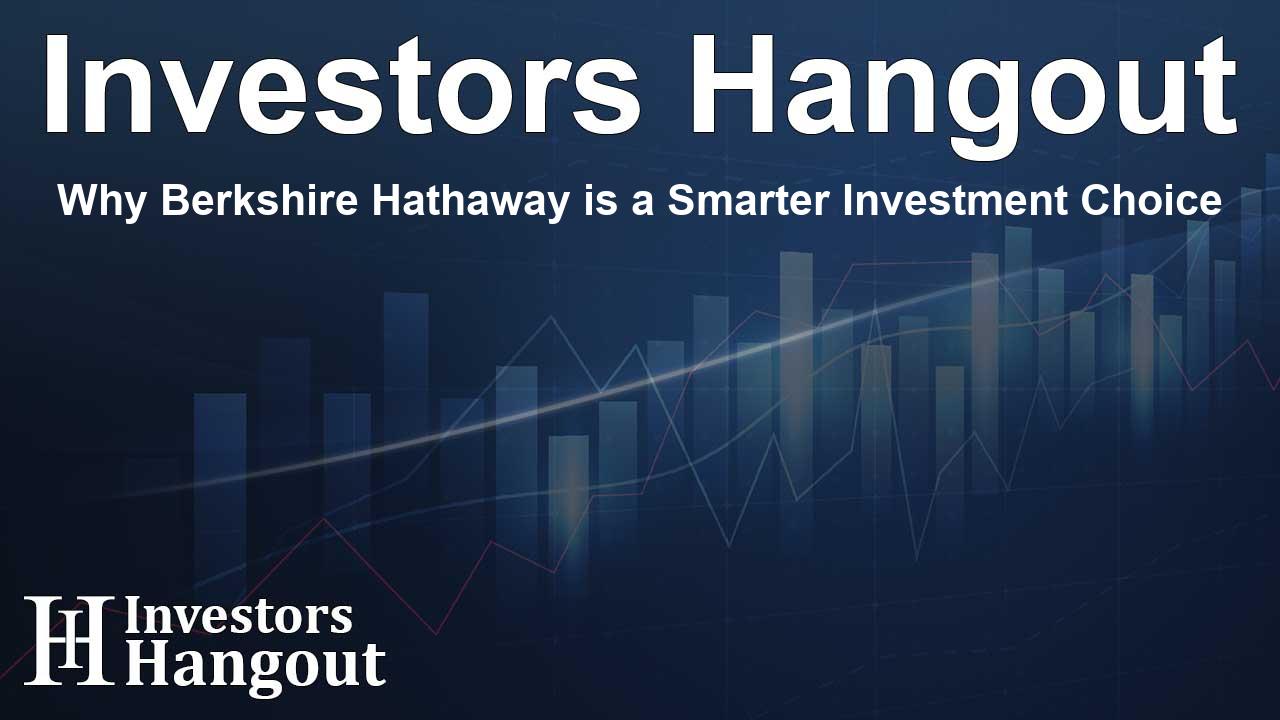Why Berkshire Hathaway is a Smarter Investment Choice

An Insightful Look at Berkshire Hathaway
Investing in Warren Buffett's renowned Berkshire Hathaway is often likened to embracing the simplicity of an exchange-traded fund (ETF). While it may not match the vast diversification of an S&P 500 ETF, Berkshire Hathaway offers substantial investment opportunities. This conglomerate boasts ownership of over 60 subsidiaries and holds stakes in more than 40 other publicly traded firms, creating a complex yet enticing investment landscape.
For many investors, aligning with Berkshire Hathaway is perceived as a more prudent investment than simply selecting an S&P 500 ETF. Here are three compelling reasons to consider this approach.
1. Superior Performance Record
Berkshire Hathaway's performance history outshines that of typical S&P 500 ETFs. For example, its year-to-date gains in 2024 have outstripped those of the most actively traded S&P 500 ETFs, including the SPDR ETF (NYSEMKT: SPY) and the Vanguard S&P 500 ETF.
Over the long term, Berkshire Hathaway has consistently delivered higher returns. Since Warren Buffett took control in 1965, the compounded average annual return of Berkshire stands at 19.8%, significantly surpassing the S&P 500's 10.2%. This remarkable performance translates to over 140 times greater growth compared to the S&P 500.
While it’s essential to acknowledge that past performance isn’t indicative of future results, Berkshire Hathaway's distinct investment philosophy may support continued growth. Buffett's approach to stock selection emphasizes predicting future earnings and finding attractive valuations, which could ensure sustained high performance well into the future.
Although Buffett cannot lead Berkshire forever, the company’s shareholders prioritize maintaining the investment strategies he established. Thus, it's expected that the legacy of prudent investing will continue.
2. Reduced Volatility
Investors often assume that high-performing stocks come with increased risk. Surprisingly, Berkshire Hathaway offers a more stable experience. Its beta coefficient in recent years stands at 0.87, revealing lower volatility than the broader market.
This trend of lower volatility extends far beyond recent history. During the 2008 financial crisis, while many stocks fell sharply, the SPDR S&P 500 ETF experienced even steeper declines, illustrating Berkshire's resilience.
Similar outcomes were observed during the market upheaval caused by the COVID-19 pandemic in early 2020. Although Berkshire shares declined, they were less affected than the SPDR S&P 500 ETF. Even when recovery took a bit longer for Berkshire, the maximum loss for investors holding S&P 500 ETFs proved more significant.
A key aspect of Berkshire’s stable nature is its substantial cash reserve strategy. By holding nearly $277 billion in cash, cash equivalents, and short-term investments as of mid-2024, Buffett can strategically invest these funds to capitalize on lower stock market valuations during downturns, contributing to its volatility advantage.
3. No Associated Expenses
While S&P 500 ETFs are known for their competitive fee structures—like SPDR S&P 500 ETF Trust with an expense ratio of 0.0945%—Berkshire Hathaway offers a remarkable perk: it has zero expense fees. Over time, the absence of these fees can lead to considerable savings and growth potential, especially when paired with its stellar performance and minimal volatility.
Overall, with its impressive track record and superior management, investors can find more merit in selecting Berkshire Hathaway over traditional S&P 500 ETFs.
Is Now the Time to Invest in Berkshire Hathaway?
Before making any investment in Berkshire Hathaway, it’s crucial to stay informed. Recent analyses have highlighted a number of stocks that could outperform, although Berkshire Hathaway often garners attention for its consistent strategies.
Regardless of the current recommendations, understanding the fundamentals of your potential investments is essential. Investing involves risk, and prudent choices stem from well-crafted research and analysis.
Frequently Asked Questions
1. What makes Berkshire Hathaway a better investment than ETFs?
Berkshire Hathaway offers superior performance records, lower volatility, and no expense fees compared to S&P 500 ETFs, which collectively enhance its attractiveness as an investment.
2. How does Warren Buffett select stocks for Berkshire Hathaway?
Buffett focuses on predicting future earnings and investing only when valuations are appealing relative to expected performance, ensuring a solid investment strategy.
3. Is Berkshire Hathaway volatile like other stocks?
No, Berkshire Hathaway has demonstrated consistently lower volatility than the broader market, making it a stabilizing factor for investors.
4. Can Berkshire Hathaway continue its growth trend?
While past performance does not guarantee future success, Berkshire's unique investment philosophy and management suggest it may maintain its growth trajectory.
5. What should I consider before investing in Berkshire Hathaway?
Assess your investment goals, consider current recommendations, and stay informed about market trends to make an informed decision about investing in Berkshire Hathaway.
About Investors Hangout
Investors Hangout is a leading online stock forum for financial discussion and learning, offering a wide range of free tools and resources. It draws in traders of all levels, who exchange market knowledge, investigate trading tactics, and keep an eye on industry developments in real time. Featuring financial articles, stock message boards, quotes, charts, company profiles, and live news updates. Through cooperative learning and a wealth of informational resources, it helps users from novices creating their first portfolios to experts honing their techniques. Join Investors Hangout today: https://investorshangout.com/
Disclaimer: The content of this article is solely for general informational purposes only; it does not represent legal, financial, or investment advice. Investors Hangout does not offer financial advice; the author is not a licensed financial advisor. Consult a qualified advisor before making any financial or investment decisions based on this article. The author's interpretation of publicly available data shapes the opinions presented here; as a result, they should not be taken as advice to purchase, sell, or hold any securities mentioned or any other investments. The author does not guarantee the accuracy, completeness, or timeliness of any material, providing it "as is." Information and market conditions may change; past performance is not indicative of future outcomes. If any of the material offered here is inaccurate, please contact us for corrections.